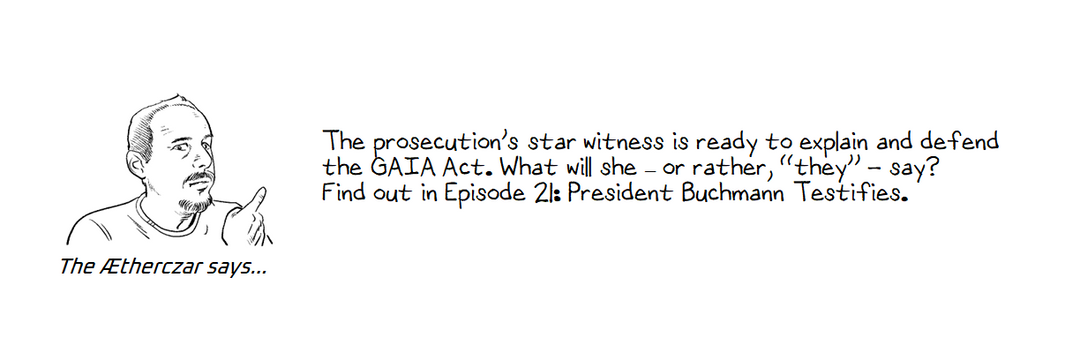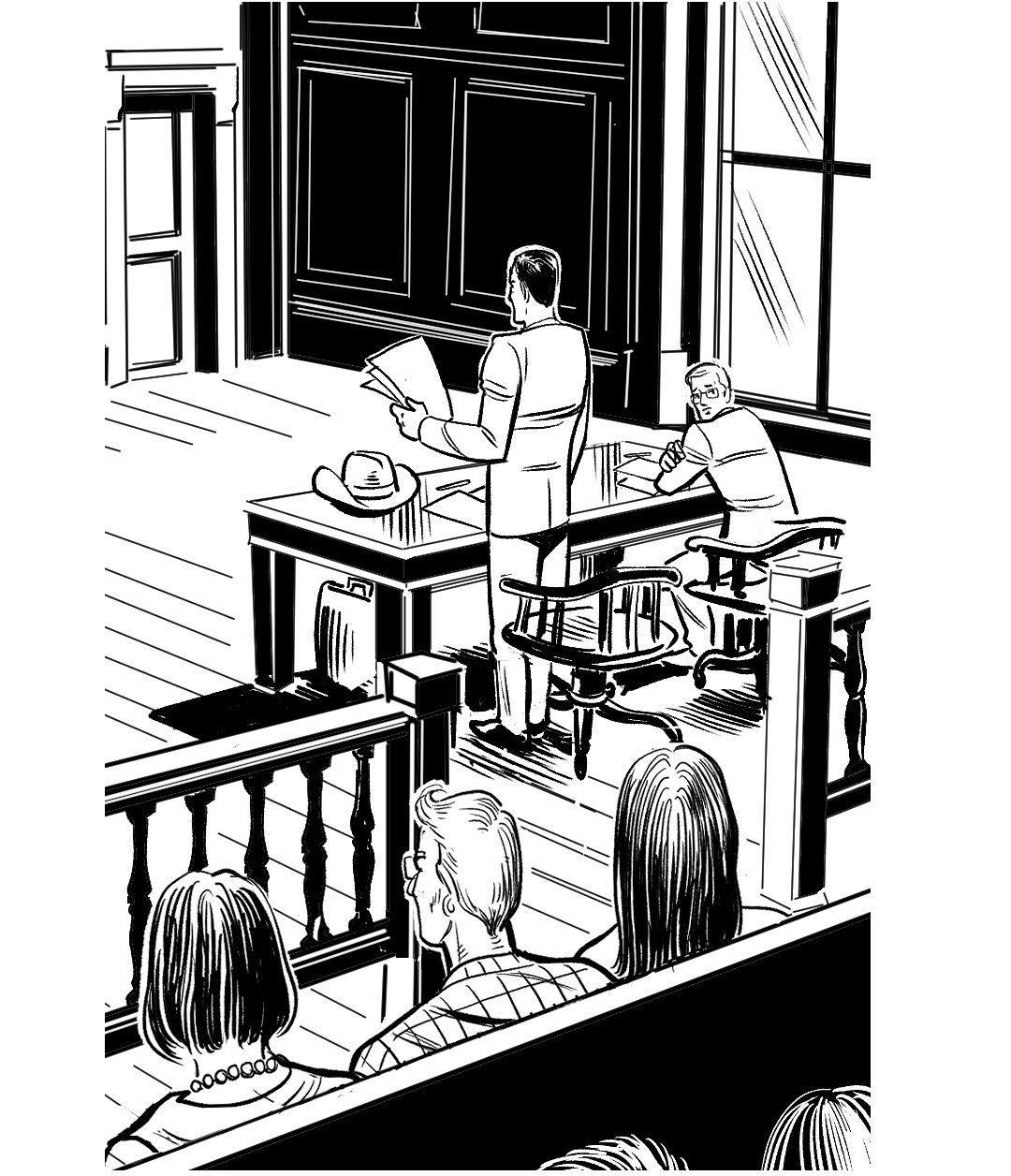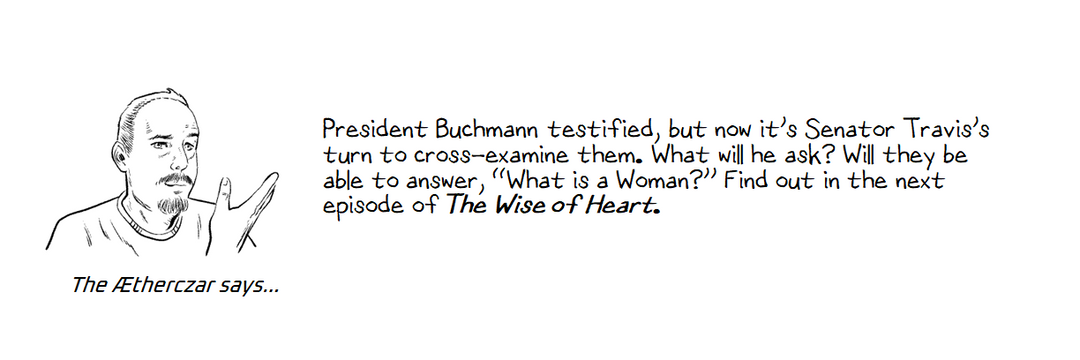
Episode 21: President Buchmann Testifies
“Hear ye! Hear ye! All rise,” the bailiff intoned yet again as all stood within the courtroom. “The Fifth District Court in and for our great Commonwealth, the Honorable Jordan Connor presiding. God save this state and this honorable court. The case of the State versus Michael Philip Andrews. All those with business before this court draw near; you will be heard.”
The judge walked into the courtroom and took his seat behind the bench.

“The jury is present,” he declared. “The defendant is present. Mr. District Attorney, are you ready to proceed?”
“We are, your honor,” the district attorney confirmed.
“Go ahead, Profesora,” the judge invited Senator Castillo forward. “The floor is yours.”
Senator Castillo rose. “The state calls Professor and University President Cassandra Buchmann.”
“Objection,” Senator Travis rose. “What is the relevance of this witness to the case?”
“Professor Buchmann will be testifying how Dr. Andrews’s biology teaching specifically violated the GAIA Act,” Senator Castillo explained, “by refusing to affirm his vulnerable student’s gender identity.”
“Offering her expert opinion to the court and to the jury?” Senator Travis asked.
“As one of the consultants who assisted the legislature in drafting the law, she can speak to the legislative intent, and the meaning and practice of gender affirmation,” Senator Castillo qualified. “As the testimony will demonstrate, she is an expert in this area, and you will have the opportunity to cross-examine her yourself, if you wish.”
“We’re all okay now with that stipulation to allow expert witnesses?” Senator Travis addressed the court. He paused a moment, and hearing no objection, he said, “Then, I withdraw my objection.”

President Buchmann took her seat in the witness stand, and the judge swore her in.
“Would you share with the court your credentials?” Senator Castillo began.
“I have a Ph.D. in women’s studies,” President Buchmann proclaimed, “I’m the author of the award-winning, New York Times Bestseller, You Are What You Feel: Untangling Gender Identity from Biology, and I hold the Steinman Chair of Social Justice at the State University where I am jointly a full professor, Director-Emeritus of the Center for Gender Studies, and I have the honor to hold the office of President of the University. I was also an advisor to the state legislature’s Standing Committee on Education, and I assisted them in the drafting of the GAIA Act.”
“My pronouns are she/her,” Senator Castillo volunteered, “and what are your pronouns?”
“I go by they/them,” President Buchmann explained. “They/them pronouns are an important way for nonbinary people – people who don’t identify with either of the traditional binary differentiations into the male or female genders – to refer to themselves. As a scholar of gender identity, it is important for me to remain impartial, showing neither fear nor favor to any extreme on the multi-dimensional space of gender identity. My pronouns serve as a personal reminder to me and to others that I maintain a strict neutrality on issues related to gender.”
“Thank you, Professor Buchmann,” the senator replied. “We’re fortunate to have so distinguished, courageous, and impartial an observer of gender realities to help educate us all today.
“Now some might argue,” Senator Castillo gave the courtroom a stunning campaign-poster smile, “that all Dr. Andrews did was share biological facts about the differences between… well, between most people who identify as boys on the one hand, and most who identify as girls, on the other hand – facts that his students already more or less knew on some level. Could you explain to us precisely how Dr. Andrews’s biological teachings deny gender identity in the sense prohibited by the GAIA Act?”
“Of course,” President Buchmann returned the smile. “As I explained to our legislators in the hearings held before adopting the GAIA Act, gender roles and the very identity of masculinity and femininity are merely social constructs. Gender is an individual journey, and a decent regard for others demands that we respect and affirm their individual identity.
“It’s really very simple.
“Women can have penises.
“Men can have periods, and vaginas, and get pregnant.
“Chromosomes cannot overrule the verdict of our hearts, and genitalia do not dictate gender.
“Claiming, like Dr. Andrews did, that we are somehow confined in a biological straitjacket, denies not only the existence of transgender people, but also denies what it means to be human.

That is the polar opposite of the loving attitude of affirmation we require of our educators, a requirement that is now enshrined in the GAIA Act.”
“But why,” Senator Castillo asked, “is it important that we affirm our young students’ gender identities?”
“Puberty can be a confusing time for young people,” President Buchmann explained. “Some require extra support and assistance to figure out who they are and how they feel. My own research showed that transgender children are at a higher risk of suffering from negative externalities like violence, discrimination, and suicide. Affirming them in their gender identities and using their chosen name and pronouns have been proven to reduce depressive symptoms, suicidal ideation, and suicidal behavior among transgender youth.”
“If we confront these potentially vulnerable transgender youths with,” Senator Castillo glared at Dr. Andrews, “cold, cruel, dispassionate scientific and biological assertions that deny their lived truths, can it actually, actively harm them?”
“Objection!” Senator Travis rose. “Leading the witness.”
“Sustained,” Judge Connor ruled.
“Allow me to rephrase that,” Senator Castillo smiled. “You’ve explained to us how Dr. Andrews’s biological teachings deny gender identity in the sense prohibited by the GAIA Act. Is this harmful?
“Oh, certainly, yes,” President Buchmann confirmed. “If we confront these potentially vulnerable transgender youths with cold, cruel, dispassionate scientific and biological claims that deny their lived truths, and if we fail to affirm, comfort, and protect them, it can cause depression and suicidal ideation.”
“Depression.” Senator Castillo shook her head as if trying to grasp the enormity of the harms inflicted by Dr. Andrews upon his student victims. “Suicidal ideation... and you mentioned earlier, violence, discrimination, and suicide. In your professional opinion, all these negative outcomes you’ve described are liable… are likely to come to pass unless we enforce the GAIA Act to protect vulnerable young students from unsupportive teachers who refuse to affirm their gender identities?”
“Yes,” President Buchmann affirmed. “Absolutely. Those are some of the dangers the GAIA Act is intended to prevent.”
“Thank you for educating us,” Senator Castillo concluded, “and thank you for your long career and service to the state and to the people.”
Senator Castillo stepped back to the state’s table.
“Your witness,” she sat down.






























































